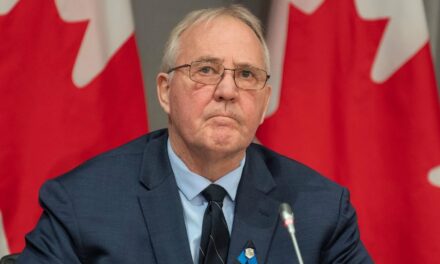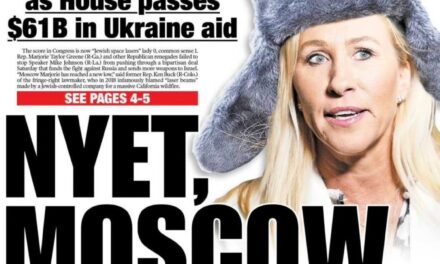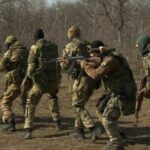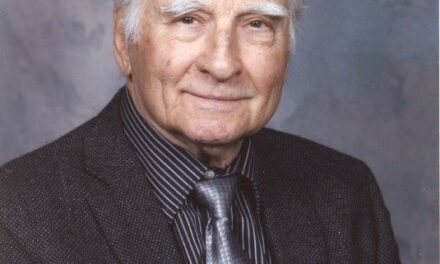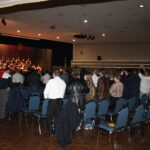Marco Levytsky, Editorial Writer.
As we reported last week, the rallies that were held across Canada to “Stand With Ukraine” encompassed an unprecedented geographic scope. It covered the entire East-West expanse of our country from St. John’s, Newfoundland to Victoria on Vancouver Island, over 5060 kilometres as the crow flies. It covered every one of our 10 provinces – even tiny Prince Edward Island which accounts for only 925 of the 1.35 million Canadians of Ukrainian origin identified in the 2016 census. It covered such places as Gaspe, where you never imagined a Ukrainian community existed in the past.
“It was truly moving and inspiring to see communities from all 10 provinces – from St. John’s on the Atlantic coast – to Victoria on the Pacific coast, and more than the dozen places in between – come together to show that Canadians Stand With Ukraine!” said UCC National President Alexandra Chyczij.
“Sunday’s (February 6) events were a powerful message from Canadians to Prime Minister Trudeau, the Cabinet and to Members of Parliament that Canada should provide Ukraine with defensive weapons immediately, to help Ukrainians defend themselves from Russia’s increasing aggression. To the people of Ukraine – we will always be with you in your fight to defend your freedom!”
The principal message of the action — a message that has been reiterated time and time again by the Ukrainian Canadian community — appears to have finally resonated with the Government of Canada which, on February 14, announced $7.8 million in lethal military equipment for Ukraine. Prior to that announcement, the government had resolutely insisted upon exhausting all avenues of diplomacy before even considering supplying defensive weapons to Ukraine, and then only as a last resort. With Canada and other countries pulling out their embassy personnel and military trainers, however, this definitely looks like a last resort measure.
Relying on diplomacy alone is fraught with danger as demonstrated by the recent visit of French President Emmanuel Macron to both Moscow and Kyiv. After meeting with Russian dictator Vladimir Putin, Macron pressured Ukrainian President Volodymyr Zelenskyy to bow to Russian demands to change Ukraine’s constitution in order to provide special status for the self-styled separatist republics. This would fatally undermine the country’s sovereignty by granting the Kremlin’s proxies a veto over both foreign and domestic policy.
According to news reports, Macron used the term “Finlandization” — or at least raised the idea — and said it was an option “on the table” for resolving the tension over Russia’s military buildup near Ukraine and Moscow’s insistence that the country be kept out of NATO forever.
What is “Finlandization”? It is a term that was coined in the 1960s to describe the Soviet Union’s control over Finland’s foreign and domestic policy that emerged from the 1948 Soviet–Finnish Treaty of Friendship, Cooperation, and Mutual Assistance. Following his August 23, 1939 Non-Aggression Pact with Nazi dictator Adolf Hitler, Soviet dictator Joseph Stalin decided to invade Finland and bring the country back under Russian control as it had been prior to the 1917 Bolshevik Revolution. Despite Moscow’s superior military strength, especially in tanks and aircraft, the Soviet Union suffered severe losses and initially made little headway. Ultimately, however, Finland had to bow to the inevitable and ceded territory to the USSR. This was followed by a second war from 1941-1944 when Germany invaded the USSR and Finland advanced just far enough to regain its lost territories. However, the country once again had to bow to the inevitable and signed an armistice agreement in 1944. Without any tangible support from the West, Finland agreed to the 1948 treaty as a means of retaining its democratic system while pledging neutrality in its foreign affairs. But it wasn’t just foreign affairs that Moscow controlled. Criticism of the USSR in Finnish media was forbidden. Films perceived to be anti-Soviet were banned. It was only after the fall of the USSR in 1991 that Finland could regain full independence in both foreign and domestic policies.
Macron later denied using the term “Finlandization”, but whether he mentioned it or not is irrelevant. The sum total of the conditions he is trying to impose upon Zelenskyy amounts to the same thing, with one major difference. Under the terms of the 1948 treaty the USSR agreed not to invade Finland and it never did. As for Ukraine, the Russian Federation agreed not to invade Ukraine under the 1994 Budapest Memorandum. Moscow has already violated that pledge.
So, despite all the public pronouncements about Western unity in confronting the threat of Russian aggression, the opposite is true. On the one hand, countries like the United States, the United Kingdom, the Baltic States, Poland and the Czech Republic are willing to support Ukraine by supplying the lethal weapons it needs to either deter a Russian attack, or at least make it very costly. On the other, countries like Germany and France, collectively, and pejoratively, described as “Old Europe”, are willing to sacrifice Ukraine’s sovereignty under the guise of diplomacy, just as France and Britain were willing to sacrifice Czechoslovakia’s sovereignty in 1938. The “Stand With Ukraine” rallies that were held February 6 sent a powerful message to Ottawa. It took the government some time to respond and, when it finally did, it offered a shipment of light arms valued at $7.8 million, military assistance which, unfortunately, falls far short of what would be required to materially augment Ukraine’s defensive capabilities. Much more will be needed if Ukraine is to have even the remotest chance of repelling a new Russian invasion. And it will require the concerted action of all democratic countries. Without strong and concerted action by the Western world, Ukraine faces, at best, a loss of independence and national agency by way “Finlandization” or, at worst, military conquest, occupation and eventual absorption into a reincarnated Russian empire.
Share on Social Media







